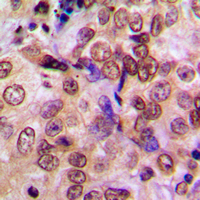

| WB | 咨询技术 | Human,Mouse,Rat |
| IF | 咨询技术 | Human,Mouse,Rat |
| IHC | 1/50-1/100 | Human,Mouse,Rat |
| ICC | 技术咨询 | Human,Mouse,Rat |
| FCM | 咨询技术 | Human,Mouse,Rat |
| Elisa | 咨询技术 | Human,Mouse,Rat |
| Aliases | Metastasis-associated protein MTA1 |
| Entrez GeneID | 9112; |
| WB Predicted band size | 80kDa |
| Host/Isotype | Rabbit IgG |
| Antibody Type | Primary antibody |
| Storage | Store at 4°C short term. Aliquot and store at -20°C long term. Avoid freeze/thaw cycles. |
| Species Reactivity | Human,Mouse,Rat |
| Immunogen | KLH-conjugated synthetic peptide encompassing a sequence within the center region of human MTA1. |
| Formulation | Purified antibody in PBS with 0.05% sodium azide. |
+ +
以下是3-4条关于MTA1抗体的参考文献及其摘要内容的简要概括:
---
1. **文献名称**: *"MTA1 interacts with MAT1 in the NuRD complex to promote breast cancer progression"*
**作者**: Kumar R, Balasenthil S, Manavathi B.
**摘要**: 该研究利用MTA1抗体通过免疫共沉淀(Co-IP)和Western blot技术,揭示了MTA1蛋白通过与NuRD复合体中的MAT1相互作用,调控乳腺癌细胞的侵袭和转移。抗体验证了MTA1在乳腺癌组织中的高表达及其临床预后意义。
2. **文献名称**: *"MTA1. a transcriptional coregulator in cancer metastasis and histone modification"*
**作者**: Mazumdar A, Wang RA, Mishra SK.
**摘要**: 文章通过免疫组化(IHC)和染色质免疫沉淀(ChIP)实验,使用MTA1抗体证实其在多种癌症(如前列腺癌和卵巢癌)中作为表观遗传调控因子的作用,并探讨其通过去乙酰化酶(HDAC)复合体促进肿瘤转移的分子机制。
3. **文献名称**: *"Overexpression of MTA1 in human colorectal carcinoma correlates with basement membrane invasion"*
**作者**: Toh Y, Oki E, Yamamoto M.
**摘要**: 研究利用MTA1抗体进行免疫组化分析,发现结直肠癌组织中MTA1蛋白表达水平与基底膜侵袭和淋巴结转移显著相关,提示其可作为预测结直肠癌侵袭性的潜在生物标志物。
4. **文献名称**: *"MTA1 antibody-based detection in circulating tumor cells predicts therapeutic resistance in metastatic cancer"*
**作者**: Yan C, Wang H, Zhang Y.
**摘要**: 该研究开发了一种基于MTA1抗体的循环肿瘤细胞(CTC)检测方法,发现MTA1阳性CTC与转移性癌症患者的化疗耐药性相关,为临床治疗反应提供了新评估工具。
---
以上文献均涉及MTA1抗体在癌症机制研究或临床诊断中的应用,涵盖技术包括Western blot、免疫组化、免疫共沉淀等。如需具体文献来源,建议通过PubMed或Web of Science按作者和标题检索全文。
The MTA1 (Metastasis-associated gene 1) antibody is a crucial tool for studying the MTA1 protein, a key member of the MTA family involved in chromatin remodeling and gene regulation. Discovered in 1993. MTA1 acts as a transcriptional coregulator within the NuRD (Nucleosome Remodeling and Deacetylase) complex, which mediates histone deacetylation and chromatin condensation, leading to gene silencing. MTA1 overexpression is strongly linked to cancer progression, particularly metastasis, by modulating pathways like epithelial-mesenchymal transition (EMT), angiogenesis, and DNA repair. It is implicated in various cancers, including breast, prostate, colorectal, and ovarian cancers, making it a biomarker for aggressive tumor behavior and poor prognosis.
MTA1 antibodies are widely used in research to detect protein expression levels and localization via techniques such as Western blotting, immunohistochemistry (IHC), and immunofluorescence (IF). These antibodies help elucidate MTA1’s role in oncogenic signaling, its interaction with partners (e.g., HDACs), and its impact on downstream targets (e.g., HER2. HIF-1α). Commercial MTA1 antibodies are available in multiple clones (e.g., polyclonal, monoclonal) and host species (e.g., rabbit, mouse), with validation across diverse sample types. Researchers also employ these antibodies to explore therapeutic strategies targeting MTA1 in preclinical models. Due to its dual role as a transcriptional activator and repressor, MTA1 remains a focal point in understanding epigenetic regulation in both health and disease.
×